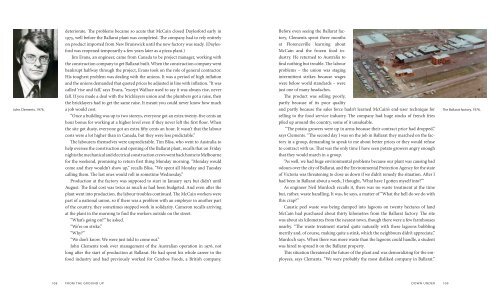From the Ground Up - McCain Foods Limited
From the Ground Up - McCain Foods Limited
From the Ground Up - McCain Foods Limited
Create successful ePaper yourself
Turn your PDF publications into a flip-book with our unique Google optimized e-Paper software.
deteriorate. The problems became so acute that <strong>McCain</strong> closed Daylesford early in<br />
1975, well before <strong>the</strong> Ballarat plant was completed. The company had to rely entirely<br />
on product imported from New Brunswick until <strong>the</strong> new factory was ready. (Daylesford<br />
was reopened temporarily a few years later as a pizza plant.)<br />
Jim Evans, an engineer, came from Canada to be project manager, working with<br />
<strong>the</strong> construction company to get Ballarat built. When <strong>the</strong> construction company went<br />
bankrupt halfway through <strong>the</strong> project, Evans took on <strong>the</strong> role of general contractor.<br />
His toughest problem was dealing with <strong>the</strong> unions. It was a period of high inflation<br />
and <strong>the</strong> unions demanded that quoted prices be adjusted in line with inflation. “It was<br />
called ‘rise and fall,’ says Evans, “except Wallace used to say it was always rise, never<br />
fall. If you made a deal with <strong>the</strong> bricklayers union and <strong>the</strong> plumbers got a raise, <strong>the</strong>n<br />
<strong>the</strong> bricklayers had to get <strong>the</strong> same raise. It meant you could never know how much<br />
a job would cost.<br />
“Once a building was up to two storeys, everyone got an extra twenty-five cents an<br />
hour bonus for working at a higher level even if <strong>the</strong>y never left <strong>the</strong> first floor. When<br />
<strong>the</strong> site got dusty, everyone got an extra fifty cents an hour. It wasn’t that <strong>the</strong> labour<br />
costs were a lot higher than in Canada, but <strong>the</strong>y were less predictable.”<br />
The labourers <strong>the</strong>mselves were unpredictable. Tim Bliss, who went to Australia to<br />
help oversee <strong>the</strong> construction and opening of <strong>the</strong> Ballarat plant, recalls that on Friday<br />
nights <strong>the</strong> mechanical and electrical construction crews went back home to Melbourne<br />
for <strong>the</strong> weekend, promising to return first thing Monday morning. “Monday would<br />
come and <strong>the</strong>y wouldn’t show up,” recalls Bliss. “We spent all Monday and Tuesday<br />
calling <strong>the</strong>m. The last ones would roll in sometime Wednesday.”<br />
Production at <strong>the</strong> factory was supposed to start in January 1975 but didn’t until<br />
August. The final cost was twice as much as had been budgeted. And even after <strong>the</strong><br />
plant went into production, <strong>the</strong> labour troubles continued. The <strong>McCain</strong> workers were<br />
part of a national union, so if <strong>the</strong>re was a problem with an employer in ano<strong>the</strong>r part<br />
of <strong>the</strong> country, <strong>the</strong>y sometimes stopped work in solidarity. Cameron recalls arriving<br />
at <strong>the</strong> plant in <strong>the</strong> morning to find <strong>the</strong> workers outside on <strong>the</strong> street.<br />
“What’s going on?” he asked.<br />
“We’re on strike.”<br />
“Why?”<br />
“We don’t know. We were just told to come out.”<br />
John Clements took over management of <strong>the</strong> Australian operation in 1976, not<br />
long after <strong>the</strong> start of production at Ballarat. He had spent his whole career in <strong>the</strong><br />
food industry and had previously worked for Cerebos <strong>Foods</strong>, a British company.<br />
Before even seeing <strong>the</strong> Ballarat factory,<br />
Clements spent three months<br />
at Florenceville learning about<br />
<strong>McCain</strong> and <strong>the</strong> frozen food industry.<br />
He returned to Australia to<br />
find nothing but trouble. The labour<br />
problems – <strong>the</strong> union was staging<br />
intermittent strikes because wages<br />
were below world standards – were<br />
just one of many headaches.<br />
The product was selling poorly,<br />
partly because of its poor quality<br />
and partly because <strong>the</strong> sales force hadn’t learned <strong>McCain</strong>’s end-user technique for<br />
selling to <strong>the</strong> food service industry. The company had huge stocks of french fries<br />
piled up around <strong>the</strong> country, some of it unsaleable.<br />
“The potato growers were up in arms because <strong>the</strong>ir contract price had dropped,”<br />
says Clements. “The second day I was on <strong>the</strong> job in Ballarat <strong>the</strong>y marched on <strong>the</strong> factory<br />
in a group, demanding to speak to me about better prices or <strong>the</strong>y would refuse<br />
to contract with us. That was <strong>the</strong> only time I have seen potato growers angry enough<br />
that <strong>the</strong>y would march in a group.<br />
“As well, we had huge environmental problems because our plant was causing bad<br />
odours over <strong>the</strong> city of Ballarat, and <strong>the</strong> Environmental Protection Agency for <strong>the</strong> state<br />
of Victoria was threatening to close us down if we didn’t remedy <strong>the</strong> situation. After I<br />
had been in Ballarat about a week, I thought, ‘What have I gotten myself into?’”<br />
As engineer Neil Murdoch recalls it, <strong>the</strong>re was no waste treatment at <strong>the</strong> time<br />
but, ra<strong>the</strong>r, waste handling. It was, he says, a matter of “What <strong>the</strong> hell do we do with<br />
this crap?”<br />
Caustic peel waste was being dumped into lagoons on twenty hectares of land<br />
<strong>McCain</strong> had purchased about thirty kilometres from <strong>the</strong> Ballarat factory. The site<br />
was about six kilometres from <strong>the</strong> nearest town, though <strong>the</strong>re were a few farmhouses<br />
nearby. “The waste treatment started quite naturally with <strong>the</strong>se lagoons bubbling<br />
merrily and, of course, making quite a stink, which <strong>the</strong> neighbours didn’t appreciate,”<br />
Murdoch says. When <strong>the</strong>re was more waste than <strong>the</strong> lagoons could handle, a student<br />
was hired to spread it on <strong>the</strong> Ballarat property.<br />
This situation threatened <strong>the</strong> future of <strong>the</strong> plant and was demoralizing for <strong>the</strong> employees,<br />
says Clements. “We were probably <strong>the</strong> most disliked company in Ballarat.”<br />
John Clements, 1976. The Ballarat factory, 1976.<br />
108 <strong>From</strong> <strong>the</strong> <strong>Ground</strong> up<br />
down under 109






